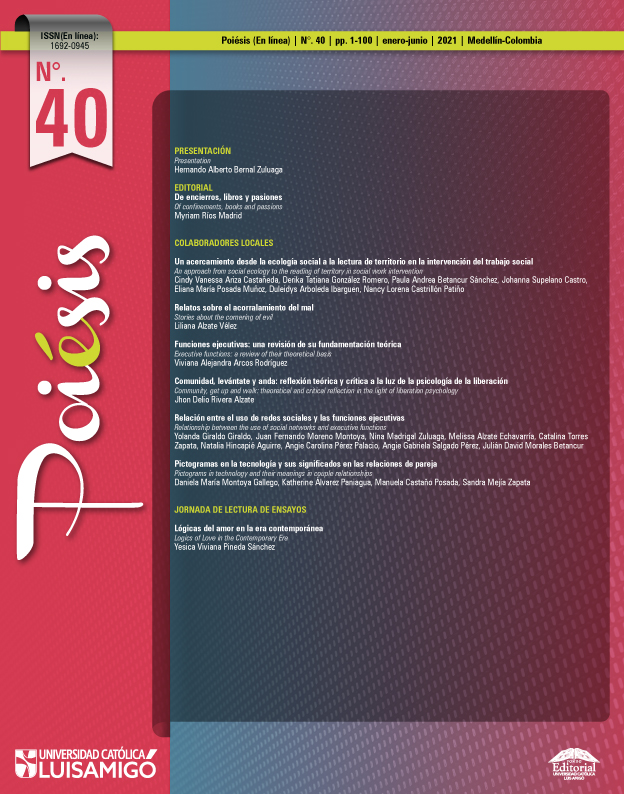Executive functions: a review of their theoretical basis
DOI:
https://doi.org/10.21501/16920945.4051Keywords:
Lower brain functions, Higher brain functions, Executive functions, Neuroanatomical localization.Abstract
This article seeks to establish the foundations of executive functions (EF) at a conceptual level, for which the following elements are proposed: a) definition of lower and higher brain functions; b) relationship between EF and anatomical-functional structure; and c) final confluence of EF in an integrative model. a) Lower brain functions are linked to the most primitive processes of the human being. They allow the satisfaction of basic needs for survival; therefore, they refer to genetically acquired capacities without any learning process for their execution. On the other hand, higher brain functions are related to the neuropsychological processes under which the capacity to modify the environment and circumstances is sustained. This occurs thanks to: memory, attention, language, abstract reasoning, gestural acts and executive functions (Rodriguez et al., 2006). These brain functions are the foundation of EF. b) Regarding its anatomical and functional location, Goldberg (2001) determines the frontal lobes as the main substrate, since they represent the executive center of the brain and the cerebral portion with the highest evolution of the cortex. These are responsible for receiving information from stimuli and from the totality of sensory modalities. c) The above conceptualization allows defining EF as a set of capacities referred to the formulation of goals, planning for the achievement of these goals and the execution of behavior in an effective manner (Lezak, 1982).
Downloads
References
Baddeley, A. (1986). Working memory. Oxford University Press.
Baddeley, A., y Wilson, B. (1988). Frontal amnesia and the dysexecutive syndrome. Brain and cognition, 7(2), 212-230. https://doi.org/10.1016/0278-2626(88)90031-0
Batista, J. (2012). Revisión teórica de las funciones ejecutivas. Lumen, (14), 1-10.
Bechara, A., Damasio, H., y Damasio, A. (2000). Emotion, decision making and the orbitofrontal cortex. Cerebral Cortex, 10(3), 295-307. https://doi.org/10.1093/cercor/10.3.295
Bérubé, L. (1991). Terminología de neuropsicología y neurología del comportamiento. Ediciones Cheneleliére.
Damasio, A., Tranel, D., y Damasio, H. (1991). Somatic markers and the guidance of behaviour: theory and preliminary testing. En H. S.
Levin, H. M. Eisenberg y A. L. Benton (Eds.), Frontal Lobe Function and Dysfunction (pp. 217-229). Oxford University Press.
Damasio, A. (1994). Descartes’ error. Emotion, reason and the human brain. Putnam’s Sons.
Damasio, A. (1998). The somatic marker hypothesis and the possible functions of the prefrontal cortex. En A. C. Roberts, T. W. Robbins y L. Weiskrantz (Eds.), The frontal cortex: executive and cognitive functions (pp. 38-44). Oxford University Press.
Goldberg, E. (2001). The executive brain, frontal lobes and the civilized mind. Oxford University Press.
González, M., y Ostrosky, F. (2012). Estructura de las funciones ejecutivas en la edad preescolar. Acta de investigación psicológica, 2(1), 509-520.
Hebb, D. (1955). Drives and the C.N.S. (conceptual nervous system). Psychological Review, 62(4), 243-254. https://doi.org/10.1037/h0041823
Lezak, M. (1982). The problem of assessing executive functions. International Journal of Psychology, 17(2-3), 281-297. https://psycnet.apa.org/doi/10.1080/00207598208247445
Luria A., Pribram, K., y Homskaya E. (1964). An experimental analysis of the behavioral disturbance produced by a left frontal arachnoid endothelioma (meningioma). Neuropsychologia, 2, 257-280. https://doi.org/10.1016/0028-3932(64)90034-X
Luria, A. (1974). El cerebro en acción. Fontanella.
Luria, A. (1986). Lenguaje y pensamiento. Martínez Roca.
Norman, D., y Shallice, T. (1986). Attention to action: Willed and automatic control of behaviour. En R. J. Davidson, G. E. Schwartz, y D. E. Shapiro (Eds.),. Consciousness and self-regulation (pp. 1–14). Plenum Press.
O’Doherty, J., Kringelbach, M., Rolls, E., Hornak, J. y Andrews, C. (2001). Abstract reward and punishment representations in the human orbitofrontal cortex. Nat Neurosci, 4(1), 95-102. https://doi.org/10.1038/82959
Rodríguez, R., Toledo, R., Díaz, P., y Viñas, M. (2006). Funciones cerebrales superiores: semiología y clínica. Revista de la Facultad de Medicina, 7(2), 20-27.
Schultz, W. (2000). Multiple reward signals in the brain. Nature Reviews Neuroscience, 1, 199-207. https://doi.org/10.1038/35044563
Shallice, T. y Burgess, P. W. (1991). Deficits in strategy application following frontal lobe damage in man. Cerebro, (2), 727-741. https://doi.org/10.1093/brain/114.2.727
Stuss, D., y Alexander, M. P. (2000). Executive functions and the frontal lobes: a conceptual view. Psychological Research, 63, 289-298. https://doi.org/10.1007/s004269900007
Stuss, D., y Benson, D. (1984). Neuropsychological studies of the frontal lobes. Psychological Bulletin, 95(1), 3-28. https://doi.org/10.1037/0033-2909.95.1.3
Stuss, D., y Benson, D. (1986). The frontal lobes. Raven Press.
Tirapu, J., Muñoz, J., y Pelegrín, C. (2002). Funciones ejecutivas: necesidad de una integración conceptual. Revista de Neurología, 34(7), 673-685. https://doi.org/10.33588/rn.3407.2001311
Valdés, J., y Torrealba, F. (2006). La corteza prefrontal medial controla el alerta conductual y vegetativo: Implicancias de desórdenes de la conducta. Revista chilena de neuro-psiquiatría, 44(3), 195-204. http://dx.doi.org/10.4067/S0717-92272006000300005
Published
How to Cite
Issue
Section
License
Copyright (c) 2021 Poiésis

This work is licensed under a Creative Commons Attribution-NonCommercial-NoDerivatives 4.0 International License.
La revista y los textos individuales que en esta se divulgan están protegidos por las leyes de copyright y por los términos y condiciones de la Licencia Creative Commons Atribución-No Comercial- 4.0 Internacional. Permisos que vayan más allá de lo cubierto por esta licencia pueden encontrarse en http://www.funlam.edu.co/modules/fondoeditorial/ Derechos de autor.











